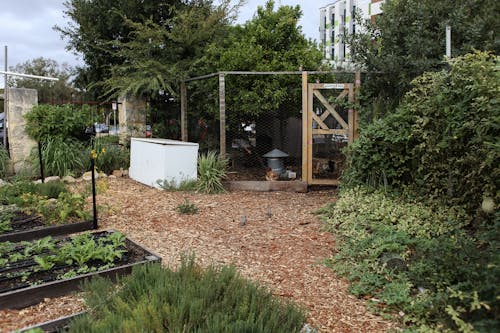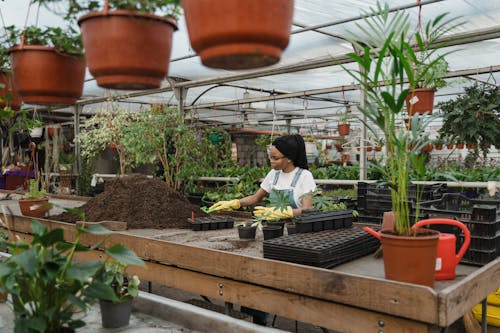
What if many of the problems our planet faces today could be solved with just a little creativity and discipline? Composting is an environmentally-friendly practice many people overlook in their day-to-day lives, but it could be an incredible way to support the planet and reduce waste.
By composting at home, you can make the most of everything from food scraps to coffee beans, and even make your garden a little greener. After all, compost acts as a probiotic, food source, and sponge for all the soil beneath it, making the earth more fertile and efficient. When you compost, you create the perfect environment for the beneficial microbes on the planet to thrive. Let’s review everything you need to know about the power of composting.
What Exactly is Composting?
Composting is essentially the process of using various “waste” items to support the natural environment by giving organic materials back to the soil of the earth. Yard waste and food scraps make up an average of around 30% of what we throw away. Rather than taking up space in a landfill, this food waste could be making the world more beautiful.
Compost is a soil-like mixture made up of decaying organic matter. It can include grass clippings, mulch, cooked fruits, grains, vegetables, eggshells, and more.
The soil of our planet is responsible for nurturing all the food we eat. Without it, we’d have a hard time surviving as a species. Composing is your chance to give something back. When you compost you improve the quality of the soil, and you minimize your personal greenhouse emissions.

Why is Composting Important?
Perhaps the most obvious benefit of composting, is it’s great for the soil. Compost is the solution to virtually any problem you might encounter in the garden. It can protect against disease, treat nutrient deficiencies, and even help to get rid of pests.
Compost significantly improves the structure of the soil by adding nutrients, balancing PH levels, and allowing for better moisture infiltration. Compost also helps with aerating and fertilizing soil. The better the quality of our soil – the more we can grow in it, from homemade veggies and fruits to herbs and plants. Other benefits of composting include:
Filtering Local Water Sources:
Compost can hold up to 20 times its own weight in water, increasing the amount of water capable of penetrating into the soil. Not only is this ideal for your plants, but it also means water can seam down into the rock layer of the earth, where it can replenish local ponds, springs, and lakes.
As the water moves through the compost, it’s also filtered, helping to keep our water sources as clean as possible. Since all the water in the world eventually makes its way to the ocean, composting can eventually help to make the water flowing into the oceans cleaner too. This means healthier sea life and cleaner seas.
Composting helps to reduce erosion, carbon emissions, and greenhouse gasses:
A significant amount of farmable land throughout the planet has been lost over the years due to pollution and erosion. Most erosion is typically caused by excess water. When unable to penetrate the ground, water swells to the surface of the planet and damages various structures. Compost helps to protect against this, by acting as a sponge to retain water.
Aside from defending against erosion, compost can also help with minimizing greenhouse gasses. Rather than sending your food to landfills, where it can rot, creating carbon dioxide and methane, composting allows you to place positive substances back into the planet.
Even better, rather than just decreasing the number of greenhouse gasses you are responsible for, composting can also actually help to draw carbon dioxide from the atmosphere back into the ground. Compost contains various beneficial microbes crucial to helping plants absorb nutrients.
When you compost, plant roots start to release carbs to keep friendly microbes around. To do this, they take CO2 from the air and water and convert it into sugars.
Composting Helps the Economy
Dealing with waste is expensive. According to some reports, the cost of transporting and storing trash will be around $375 billion per year in 2025. Composting significantly reduces landfill costs on a local level and can eventually reduce the overall costs of managing waste on a global scale.
With composting, we transform what would be a wasted resource into a valuable resource that helps to generate more revenue and food (rather than costing us money). Composting can even help to reduce the production costs for farmers. If you create compost at home and give it to local farmers, they can use that instead of spending money on expensive substances to grow their farms.
What’s more, composting plants have been shown to help with creating more jobs than the standard disposal facilities like incineration and landfill locations, so you can improve the local economy on a significant scale.
Composting Makes the World a Healthier Place
Aside from improving the quality of our air, soil, water, and economy, composting also helps to make the planet a healthier place. The US, and many other parts of the world are struggling from an increasing shortage of landfill capacity. Imagine what might happen if the landfills we have today start overflowing? Pests and health issues would be everywhere.
Composting also helps to make the planet healthier by improving the quality of the food we grow. The widespread use of chemical fertilizers and pesticides has led to much of the soil around the world losing a significant amount of its nutrient content. Less nutritious soil means less nutritious foods.
Compost makes for nutrient-rich soil, so plants can grow bigger, healthier, and more efficient for hungry stomachs.
How Can You Start Composting at Home?
Composting at home can be a part of a new lifestyle approach for you and your family. Many people interested in home composting see it as an opportunity to take a new regenerative approach to the world, where we use everything, we have more positively, and reduce overall waste.
Composting at home can be extremely simple. Most composting requires three basic ingredients:
- Water: Moisture to help support the soil
- Greens: Materials like vegetable waste, grass clippings and fruit scraps
- Browns: Dead leaves, twigs, branches, and mulch
Your compost pile should have an equal amount of green and brown, as well as moisture to help break down organic matter. You can start collecting things to compost in various bins around your home, just like you collect products for recycling now. Here are just some of the things you can compost:
- Fireplace ashes
- Sawdust and wood chips
- Leaves, houseplants, and grass clippings
- Hay and straw
- Cotton and woollen rags
- Hair and fur
- Cardboard, paper, and shredded newspaper
- Coffee grounds and filters
- Nut shells and egg shells
- Fruits and vegetables
If you’d rather not deal with the mess of composting at home, you can always look into local community groups hoping to collect compost for various farms and gardens. A lot of towns and cities are beginning to work together on composting. There are even companies like Starbucks which allow people to return used coffee beans to stores for composting purposes.
Alternatively, look into donating collectable composting materials to community gardens and farms yourself. Many of these locations would be happy to receive compost if it’s collected properly.

What Not to Compost
While many items are compostable, some should usually be avoided for the majority of homeowners. It’s best to avoid composting:
- Black walnut twigs and leaves: These release substances which can be harmful to plants.
- Coal and charcoal ash: Can be dangerous to plant growth.
- Dairy products: May attract flies and pests with odor problems.
- Diseased plants: Insects and diseases may transfer to other plants.
- Oils, lards, grease, and fats: Can attract pests and rodents.
- Meat and fish bones: May attract rodents and pests.
- Pet waste: Can contain bacteria, parasites, and germs
Join the Composting Community
If you’ve been looking for ways to live a more ethical lifestyle, getting involved with composting can be an excellent way to do it. The composting community is dedicated to protecting the planet and helping food sources to thrive all around the world.
Even if you just start with something simple, like collecting your coffee grounds, you’ll be making a positive impact on your environment.






